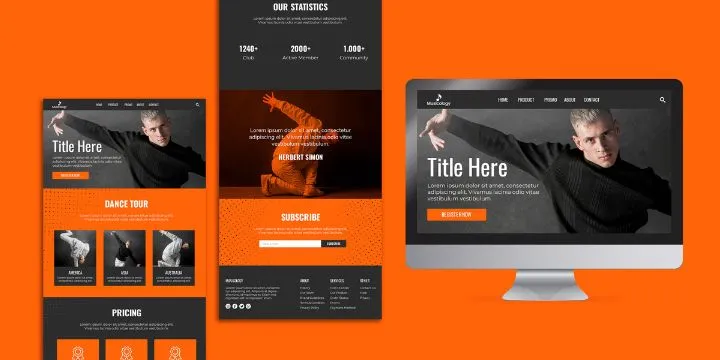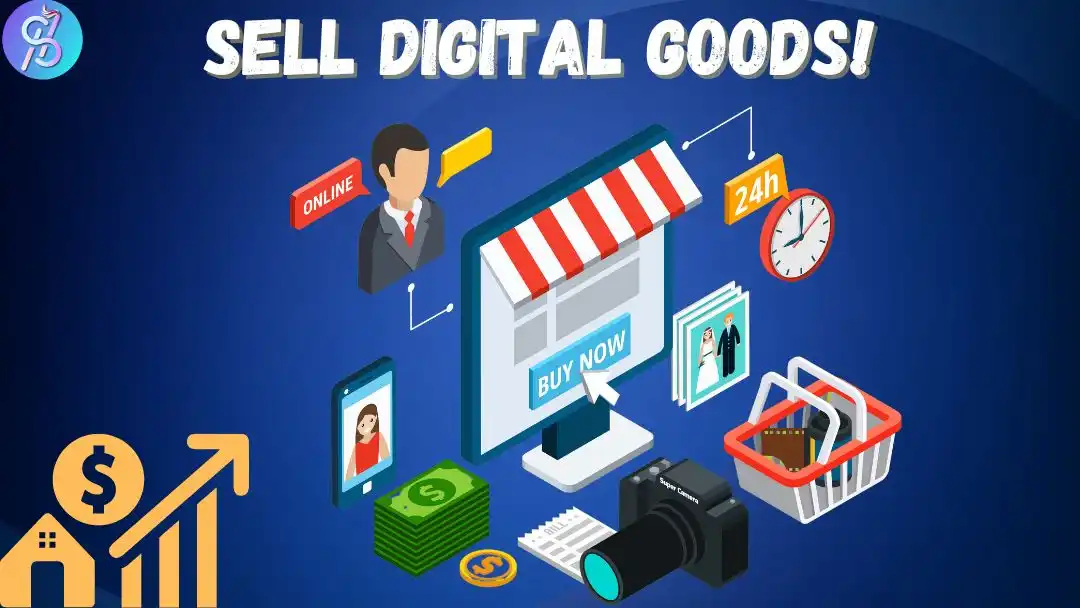Think you can’t make serious money with digital products? These surprising platforms will make you a believer in 2024.
The world of digital products is booming, and 2024 presents a wealth of opportunities to earn income from your creations. Whether you have existing digital products like ebooks, courses, or templates, or are looking to acquire resell rights digital products or plr digital products to resell, finding the right platforms is crucial.
If you’re wondering where to buy digital products to resell don’t worry. We’ll guide you through the best places to sell digital products, including marketplaces that cater to both original content and products with resell rights. Even if you want to offer free digital products to resell as lead magnets or promotions, we’ll cover the strategies you need.
Get ready to maximize your reach and revenue in the exciting digital landscape of 2024!
Digital products vs Physical products
Imagine this: instead of selling cookies at a bake sale, you create a downloadable recipe book. That’s the basic difference between digital and physical goods. Digital stuff, like ebooks, music, or online classes, lives on your computer or phone.
You create it once, sell it online over and over again, and poof! No more baking hundreds of cookies – you just keep improving your recipe for happy customers.
Physical goods, on the other hand, are the things you can hold – clothes, toys, or even those cookies. You gotta make them again and again, or order a whole batch to sell. With digital products, it’s all about creating something awesome once and letting the internet do the rest.
Best Profit-generating ideas to sell digital products
- Ebooks
- Online Course
- Graphics Templates
- Website themes and templates
- Subscription-based content
- Digital templates and tools
- Product photography
- Digital services
- Printable digital products
- Digital memberships
- Digital marketing services
1. Ebooks
Ebooks are basically books you read on your screen. They’re a super popular digital product because you can write them on just about anything – how-to guides, novels, even recipe collections. The best part? You can sell them online.
If you don’t have your own Ebook, don’t worry. You don’t have to write them yourself! Look for ebooks with “resell rights.” This means you can sell them and keep the profits. Find ebooks labeled “RR,” “PLR,” or “MRR.” Buy only from trusted websites to avoid copyright issues.
👍 Pros: Easy to create and sell, way cheaper than printing physical books, people can buy them from anywhere in the world.
👎 Cons: You need a computer or e-reader to enjoy them, and there’s tons of competition out there since anyone can publish an ebook. Some people miss the feel of a real book, and you need a device to read them. Also, anyone can write an ebook, so there’s a lot of competition out there.

2. Online Course
Online courses are like taking a class, but on your own time and from the comfort of your home! They’re a fantastic type of digital product because you can teach people valuable skills on just about any topic. You can definitely sell them online.
👍 Pros: You can reach a huge audience, they’re often more in-depth than ebooks, and can generate ongoing income.
👎 Cons: They take more time and effort to create than ebooks, and there’s competition since lots of people are offering courses.

3. Graphic Templates
Graphic templates (like those for Canva, Photoshop, or After Effects) are pre-made designs that make life easier for anyone who needs visuals! Think social media posts, website layouts, even video effects – there are templates for everything. You can definitely sell these online.
👍 Pros: Templates save people tons of time, there’s always a demand for fresh designs, and they’re relatively easy to create if you have the skills.
👎 Cons: The market can be competitive, and you might need to specialize in a specific style or type of template to stand out.

4. Website themes and templates
Website themes and templates are like blueprints for building a website. They give you a basic layout, design elements, and sometimes even features to get you started. You can totally sell them online.
👍 Pros: They save people tons of time and money compared to designing a site from scratch. Plus, there’s a huge market for themes for different platforms (like WordPress or Shopify).
👎 Cons: It takes coding knowledge to create good themes, and the competition can be tough since there are lots of free options out there too.

5. Subscription-based content
Subscription-based content is like joining a club where you get regular goodies. Instead of buying an ebook or course once, you pay a monthly fee for access to a whole library of stuff. This could be exclusive articles, videos, tools, or even a community of like-minded people. You can absolutely sell this online.
👍 Pros: Predictable income, you build a loyal following, and can offer a wider range of content.
👎 Cons: You need to consistently create fresh material to keep people subscribed, and it can be harder to attract new members than selling one-off products.

6. Digital templates and tool
Digital templates and tools are lifesavers for busy people! Think spreadsheets to organize finances, checklists for projects, or even apps that help with specific tasks. These are all awesome digital products you can sell online.
Here are just a few examples:
- Plugins, filters and presets for media editors.
- Digital media planners.
- Mobile apps for businesses.
- Graphic design templates for print materials and websites.
- Fonts, logos, icons and UX kits.
👍 Pros: They solve specific problems people are willing to pay for, and they can be tailored for different niches.
👎 Cons: Sometimes you need specialized skills to create them, and it can be difficult to stand out if there are similar tools already out there.
7. Product photography
If you’ve got a knack for taking beautiful product photos, you can turn that skill into a digital product! People selling online always need eye-catching images, and you can sell them your photos directly or as stock images on specialized websites.
👍 Pros: There’s a constant demand for good product photography, and you have the flexibility to shoot whatever types of products you like.
👎 Cons: It takes photography skills and equipment to get started, and finding ways to make your photos stand out takes effort.

8. Digital services
Digital services are basically offering your skills online! This could be anything from writing and editing, to graphic design, website development, or even virtual assistance. You can definitely sell these services online.
👍 Pros: Low startup costs, you can work from anywhere, and a huge variety of services mean there’s something for everyone.
👎 Cons: Competition can be high, and you’ll need to market yourself to find clients consistently.

9. Printable digital products
Printable digital products are awesome because they combine the digital world with the joy of physical things! Think planners, coloring pages, wall art, greeting cards – anything people can download and print at home. You can absolutely sell these online.
👍 Pros: Easy to create, wide variety to appeal to different interests, and you don’t have to worry about shipping physical items.
👎 Cons: People need their own printers to enjoy them, and competition is high since lots of people are offering printables.
10. Digital memberships
Digital memberships are like an online club where members pay a recurring fee to access exclusive content or benefits. This could be special courses, a supportive community, tools, or even regular coaching. You can sell memberships through your own website or special platforms designed for this purpose.
👍 Pros: Potential for steady income, you build a loyal community, and it’s great for offering ongoing value to your audience.
👎 Cons: You need to create enough high-quality content to keep members happy, and promoting your membership takes continuous effort.
11. Digital marketing services
If you’re a whiz at getting websites found online, running social media ads, or writing killer emails, you can bundle those skills up as digital products! This means offering services like SEO, social media management, or email marketing to businesses. You can sell your services directly to clients, through freelance platforms, or even create packages on your own website.
👍 Pros: High demand for skilled marketers, potential for recurring income with retainer clients, and you can work with businesses all over the world.
👎 Cons: Finding clients takes effort, and you’ll be competing with other freelancers and agencies.
Finding the Right Platform To Sell Digital Goods
Ready to turn your digital creations into cash? Choosing the right platform is key!
There are tons of marketplaces out there, each with its own strengths and focuses. Do you want to sell ebooks, courses, or maybe even subscription services? Some platforms are better for specific types of digital products. Don’t worry, finding the perfect fit is easier than you think.
Start Selling Digital Products: Build a Profitable Online Store
Ready to turn your skills and knowledge into a profitable online business? Selling digital things is an excellent method to do this. Think about what you’re good at – maybe you’re a design whiz, a writing pro, or an expert in a specific field. Now, package that expertise into a digital product like an ebook, course, or template. Next, you’ll need a place to sell your creations. There are tons of platforms designed for selling digital products, so find the one that fits your needs and start building your store.
- Brainstorm and research
- Brainstorm: Write out your skills and interests. What kind of digital products could you create (e.g., an ebook on gardening, a Photoshop template pack, a course on web design)?
- Research: Are people already searching for these kinds of products? Check out online marketplaces and competitor websites.
- Validate your idea
- Test the waters: Before diving in headfirst, create a simple landing page describing your product idea. See if people sign up for your email list – this shows interest!
- Beta testers: Offer a sneak peek of your product to a small group in exchange for their honest feedback.
- Find your target market
- Ideal customer: Who would benefit the most from your digital product? Imagine their age, interests, and problems your product solves.
- Hangout spots: Where does your target market spend time online (e.g., Facebook groups, specific subreddits, niche forums)?
- Build your online store
- Choose a platform: Research platforms like Etsy, Shopify, or Podia based on your product type and features you need (payment processing, email integration, etc.).
- Create fantastic listings: Write compelling product descriptions, use high-quality images, and make it easy for people to buy.
- Increase and drive traffic
- Social media: Share valuable content related to your products, run contests, and connect with potential customers.
- Email marketing: Build an email list and nurture leads with useful information and promotions.
- Collaborations: Partner with related businesses or influencers to reach a wider audience.
Where to Sell Digital Products online?
Choosing the right platform is key to success. There are tons out there – some are perfect for specific products, others are great for beginners.
Let’s find the perfect place to turn your digital creations into a profitable business.
1. Sellfy
Sellfy is a user-friendly platform built specifically for selling digital products. It’s perfect for creators who want a simple way to get started. Key features include easy store setup, tools for marketing and promotions, and the ability to sell physical products too.
Features:
- Easy to set up your online store
- Sell subscriptions and physical products alongside your digital goodies
- Built-in marketing and promotion tools
Pros:
- Great for beginners
- Affordable pricing plans
- Versatile for different product types
Cons:
- Limited design customization compared to some competitors
- Basic analytics features
2. Podia
Podia is an all-in-one platform for selling digital products and memberships. Perfect for creators who want to build a community around their content.
- Features:
- Sell courses, ebooks, downloads, coaching, and memberships.
- Create a beautiful website to showcase everything.
- Built-in email marketing and messaging tools.
- Pros:
- Great for offering different content formats.
- Community features are top-notch.
- Easy to use, even for beginners.
- Cons:
- Can get more expensive as your business grows.
- Fewer design customization options than some website builders.
3. Shopify
Shopify is a powerful e-commerce giant that can also handle your digital product sales. While it requires a bit more setup than specialized platforms, it offers lots of flexibility and potential for growth.
- Features:
- Requires using digital download apps to deliver products
- Extensive customization options for your store’s design and functionality.
- Huge marketplace of apps and integrations for marketing, sales, etc.
- Pros:
- Ultimate scalability if your business expands
- Full control over your store and branding
- Excellent for selling both digital and physical products
- Cons:
- Steeper learning curve than platforms specifically for digital products
- Can get pricey with transaction fees and paid apps
4. EasyDigitalDownloads
EasyDigitalDownloads is a WordPress plugin designed specifically for selling digital products. If you’re already familiar with WordPress, this is a great option.
- Features:
- Built-in features to manage your digital products and sales.
- Integrates with popular payment gateways.
- Simple customer management system.
- Pros:
- Free to start with (premium extensions available for more features)
- Great if you already have a WordPress website.
- Easy to use if you’re comfortable with the WordPress platform.
- Cons:
- Requires WordPress setup and knowledge.
- Less scalable than a full-blown e-commerce platform like Shopify.
5. GumRoad
Gumroad is a super popular platform known for its simplicity. It’s a fantastic option if you want to start selling digital products quickly and easily.
- Features:
- Easy-to-use interface for setting up your products.
- Built-in payment processing and customer management.
- Options for subscriptions and memberships.
- Pros:
- Great for beginners.
- Affordable pricing plans.
- Fast and easy to get started.
- Cons:
- Limited design customization of your storefront.
- Fewer advanced features compared to some competitors.
6. Thinkific
Thinkific is a popular platform built specifically for creating and selling online courses. It’s ideal if you want to focus on delivering top-notch educational content.
- Features:
- Powerful course builder with quizzes, multimedia, and more.
- Website and membership features.
- Marketing and sales tools to help you find students.
- Pros:
- Excellent for creating engaging, in-depth courses.
- Student community features to foster interaction.
- Flexible pricing options.
- Cons:
- Less design flexibility than some website-focused platforms.
- Can be limited if you want to sell a variety of digital products beyond courses.
7. E-junkie
E-junkie is a veteran player in the digital product space. It’s a reliable and affordable option for those who want a no-frills way to get their products online.
- Features:
- Simple shopping cart integration for your website or even social media.
- Automatic file delivery after purchase.
- Affiliate program features to help you boost sales.
- Pros:
- Super affordable pricing plans.
- Easy to set up and use.
- Great for simple digital product sales.
- Cons:
- Store design is very basic.
- Fewer features compared to all-in-one platforms.
- No built-in marketing or community tools.
8. ClickBank
ClickBank is a classic marketplace focused on digital products and affiliate marketing. It’s a good option if you want to tap into a large network of affiliates to promote your creations.
- Features:
- Huge marketplace with access to potential customers
- Affiliate program built-in (others can sell your products for a commission)
- Handles processing payments and product delivery
- Pros:
- Potential to reach a wider audience through affiliates.
- Easy to get started.
- No need to build your own store.
- Cons:
- High competition within the marketplace.
- ClickBank takes a cut of your sales.
- Less control over branding and customer experience.
9. FastSpring
FastSpring is a robust platform that handles the complexities of selling digital products globally. It’s great for businesses that need advanced features and international tax compliance.
- Features:
- Handles global sales and tax regulations.
- Subscription management tools.
- Customizable checkout experiences.
- Pros:
- Takes the headache out of international sales and taxes.
- Powerful for businesses with complex needs.
- Reliable and secure platform.
- Cons:
- Not the most beginner-friendly option.
- Can be more expensive than simpler platforms.
10. SendOwl
SendOwl is a streamlined platform focused on making digital product delivery easy! It’s a great option if you want a reliable way to manage downloads, protect your products, and get paid.
- Features:
- Secure file delivery and customizable download links.
- Built-in features for subscriptions, memberships, and drip content.
- Integrations with popular payment gateways and marketing tools.
- Pros:
- Easy to use, even for those who aren’t tech-savvy.
- Affordable pricing plans that scale with your business.
- Excellent features for protecting your digital content.
- Cons:
- Less customizable storefront design compared to bigger platforms.
- Might need integrations for more advanced marketing features.
11. ThemeForest by Envato
ThemeForest, part of the Envato marketplace, is a treasure trove for website themes and templates. It’s a great place to sell your digital creations if you design for platforms like WordPress, Shopify, and more.
- Features:
- Massive marketplace with a huge potential audience.
- Dedicated section for digital items like HTML templates, graphics, and more.
- Strict quality review process to maintain standards.
- Pros:
- Tap into Envato’s established customer base.
- Potential for high sales volume.
- Compete with other talented designers.
- Cons:
- High competition within the marketplace.
- Envato takes a portion of your earnings.
- Your items need to meet specific quality guidelines.
12. Creative Market
Creative Market is a huge marketplace focused on ready-made design assets. It’s a fantastic place for designers and creatives to sell their digital products.
- Features:
- Specializes in fonts, graphics, templates, photos, and more.
- Easy to upload and list your products.
- Reach a massive audience of potential buyers.
- Pros:
- Great for showcasing your design work.
- Community of creatives offers support and inspiration.
- No need to build your own online store.
- Cons:
- High competition in a crowded marketplace.
- Creative Market takes a cut of your sales.
- Less focus on courses or memberships.
13. Sell Digital product on Youtube
YouTube isn’t just for videos – it’s a fantastic way to connect with potential customers and sell your digital products.
- How to do it:
- Create valuable videos related to your products to build an audience.
- Mention your products in videos and include links in the descriptions.
- Use YouTube’s built-in tools like end screens and cards to promote your offerings.
- Pros:
- Access to a huge audience.
- Builds trust and authority with potential customers.
- Video content can be super engaging.
- Cons:
- Takes time to build a following.
- Requires video creation skills and equipment.
- Can be difficult to stand out in a crowded marketplace.
14. Sell Digital Products on Social media Like Facebook instagram tiktok
Social media platforms like Facebook, Instagram, and TikTok aren’t just for fun – they’re powerful tools to sell digital products! Here’s how it works:
- Features:
- Build an audience of potential buyers by sharing valuable content.
- Utilize paid advertising to target specific groups of people.
- Some platforms (like Instagram) have shopping features for direct sales.
- Pros:
- Access to a huge potential customer base.
- Opportunity to connect with customers on a personal level.
- Relatively low cost compared to setting up your own website.
- Cons:
- Can be time-consuming to build the following organically.
- Competition is high, so standing out takes effort.
- Some platforms have limitations on selling digital products directly.
15. Run Ads To Sell Digital Products
If you have the budget, paid advertising can be a powerful way to supercharge your digital product sales. Here’s a quick breakdown of three popular platforms:
Facebook Ads
- Pros: Huge audience, detailed targeting options (interests, demographics, behaviors), good for creating visually appealing ads.
- Cons: Can be competitive, figuring out the best targeting takes some experimentation.
TikTok Ads
- Pros: Massive reach with younger audiences, video format perfect for showcasing products in action, still a bit of a ‘wild west’ with less competition.
- Cons: Requires creating engaging video content, audience might not be ready to buy complex products on this platform.
Google Ads
- Pros: Reach people actively searching for solutions (your product!), can target specific keywords, potential for high conversion rates.
- Cons: Can be expensive for competitive keywords, text-based ads are less exciting than visuals.
Benefits of selling Digital Products Online
.Selling digital products offers a whole new level of freedom and income potential! Imagine waking up on your own schedule, working from your favorite coffee shop (or your couch in pajamas), and watching your bank account grow. No need to package and ship products, and the profit margins are seriously impressive.
Here’s what makes it so appealing:
- Flexibility: Work from anywhere, set your own hours – you’re the boss!
- Large profit margins: No physical production costs mean more money in your pocket.
- Efficiency: Create a product once, sell it repeatedly with minimal extra effort.
- Scalability: Sell to one person or a thousand. The Potential is infinite.
- Low risk: Minimal upfront investment compared to launching a physical product business.
Sounds good? If you’re ready to embrace the freedom and potential of digital products, the time to start is now.
The Last Words (Conclusion)
So, are you ready to take the leap and start cashing in on your digital skills? The world of digital products is booming, and there’s never been a better time to get started. Remember, it’s about more than just having a cool product. Choosing the right platform, building an online store, and getting the word out are just as important. Whether you’re a seasoned creator or just starting out, finding a platform that works for you and understanding the benefits of selling digital products can turn your passion into real profits. Don’t just dream about financial freedom – make it happen in the exciting world of selling digital products online!


0 Comments